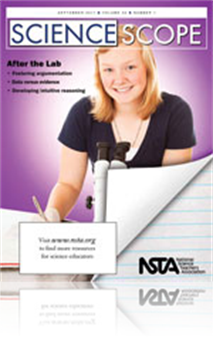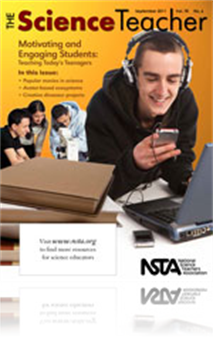All Resources
Journal Article
Students of exercise science are well positioned to facilitate a shift of the nation's attitude on health care from disease treatment to disease prevention. This report chronicles the authors' efforts toward transforming the exercise physiology core ...
Journal Article
Methods and Strategies: The Concept of a Model
This column provides ideas and techniques to enhance your science teaching. This month’s issue discusses ways to teach students the meaning behind models and not just what they represent....
Journal Article
Science Shorts: Blood in a Bag
This column provides classic classroom activities that emphasize science process skills. In this month’s issue models representing organ systems are explored....
Journal Article
Teaching Through Trade Books: Earthquakes!
This column includes activities inspired by children’s literature. This month’s issue covers two books that deal with earthquakes....
Journal Article
A lesson on snow demonstrates several principles of practice for using models in elementary science. The article also discusses how models can be used to help students construct meaning as they compare the properties of models....
Journal Article
An Introduction to Tissue Engineering Using Hydrogels
This article presents a three-part classroom activity that introduces students to examples of research in the field of tissue engineering and allows them to replicate experiments being done in university laboratories using alginate hydrogels....
Journal Article
Science and Children’s editor shares thoughts regarding the current issue....
Journal Article
The Accreditation Process for Science: The Path Leads to Unintended (Positive) Consequences
This article discusses how a community of scholars came together to create assessments across science departments for a teacher preparation program in secondary science teaching....
Journal Article
Extended Problem-Based Learning Improves Scientific Communication in Senior Biology Students
This article describes a model of extended problem-based learning that instructed upper-level undergraduate students to focus on a single biological problem while improving their critical-thinking, presentation, and scientific-writing skills....
Journal Article
This article discusses a Volcanic Concept Survey, an instrument designed to measure conceptual understanding of volcanic processes and hazards. Scores from this survey show that students who learned about volcanoes from nontraditional sources, such a...
Journal Article
What Students Really Want in Science Class
The authors asked biology students "What helps high school students learn science?" They share the digital resources and other classroom activities that students thought would help them learn science....
Journal Article
Case Study: The Chemistry of Cocaine
This column provides original articles on innovations in case study teaching, assessment of the method, as well as case studies with teaching notes. This month’s case study focuses on the chemistry of cocaine to teach a number of core concepts in o...







